
The Top 10 Project Management Knowledge Areas
August 29, 2024
Project management is the art and science of leading a project to meet its objectives within given constraints. These constraints typically include time, cost, and scope, but many more factors…
Project management is the art and science of leading a project to meet its objectives within given constraints. These constraints typically include time, cost, and scope, but many more factors must be considered.
The Project Management Institute (PMI) has identified 10 key project management knowledge areas that every project manager should master. These areas guide the management and execution of projects across various industries and sectors.
Read this blog to gain a deeper insight into these areas and how they can contribute to your project’s success.
10 Project management knowledge areas
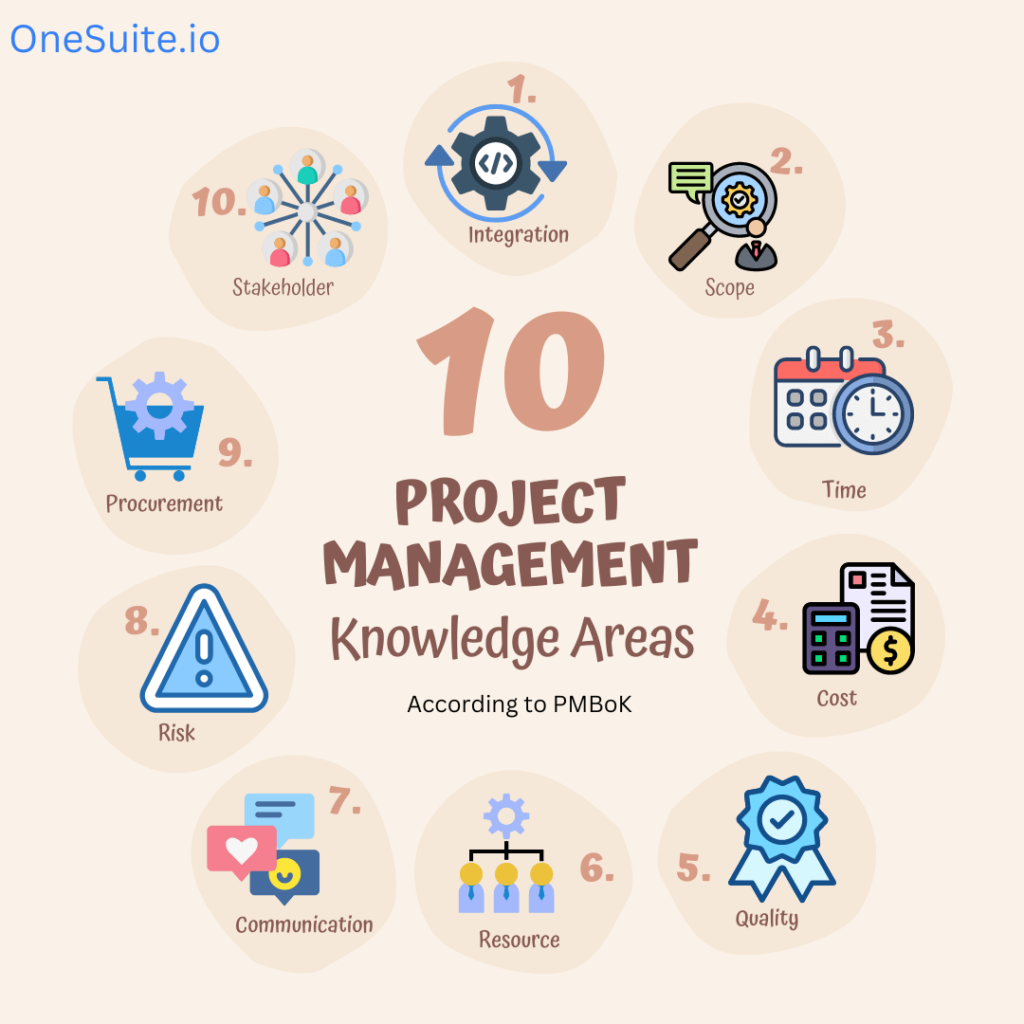
To run a project successfully, there are a total of 10 knowledge areas you should follow. However, depending on your project size, you can avoid many areas of knowledge.
Here are 10 knowledge areas for your project management—
1. Project Integration Management
Project Integration Management is a comprehensive area of project management knowledge. It coordinates all the diverse elements of a project, including tasks, resources, teams, clients, and stakeholders, to name a few.
It ensures all parts of a project work together smoothly. For example, if you’re creating a website, this process ensures that the plan outlines each step, from designing the layout to writing content and developing features, ideally.
In short, Project Integration Management is about coordinating all the moving parts to achieve a successful project outcome.
2. Project Scope Management
Project Scope Management is a process to manage all the necessary tasks related to a project within a project. It helps to complete a project within a deadline by focusing only on prioritized tasks.
When building a website, Scope Management ensures you stick to the agreed-upon features, like creating a homepage and contact page, without adding unnecessary extras that could delay the project.
OneSuite’s My Task feature will help you in project scope management knowledge area.
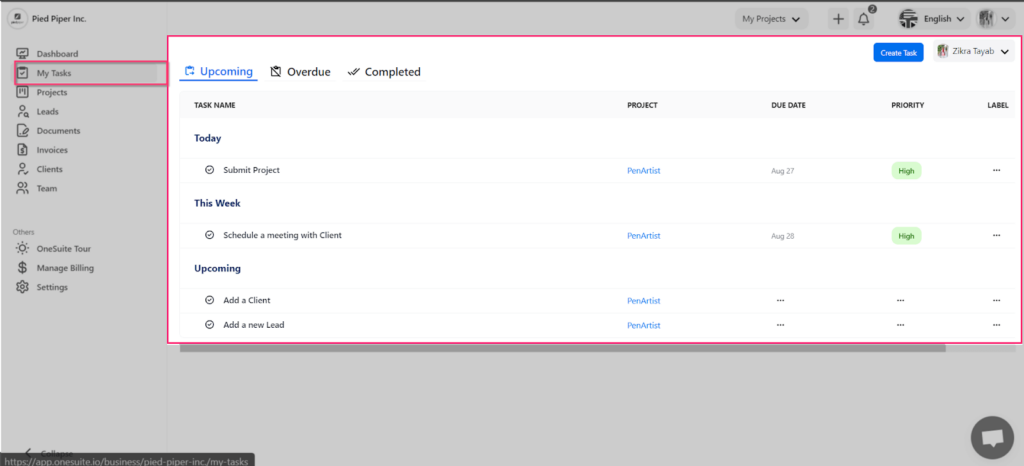
In this section, your team members can add their own tasks and organize them by Today, This Week, and Upcoming. This way, your team members can focus on the tasks that come first in terms of necessary, and your project can meet the original goal on time.
It keeps the project focused on its original goals, preventing scope creep and ensuring resources are used efficiently. This efficient resource management instills confidence in the team and stakeholders about the project’s progress.
3. Project Time Management
Project Time Management is the most concerning aspect for project managers. It is one of the major components of project management knowledge areas. It is a process where you can define the time spent and the progress of a project.
With project time management, you can create a timeline for every task on your project. If you are writing a blog, you can schedule and define tasks like to-do, outline, write, Review, update, and publish to meet the deadline.
In OneSuite—a project management software, you can set up project time management with a kanban view to meet all your deadlines and complete the projects successfully.
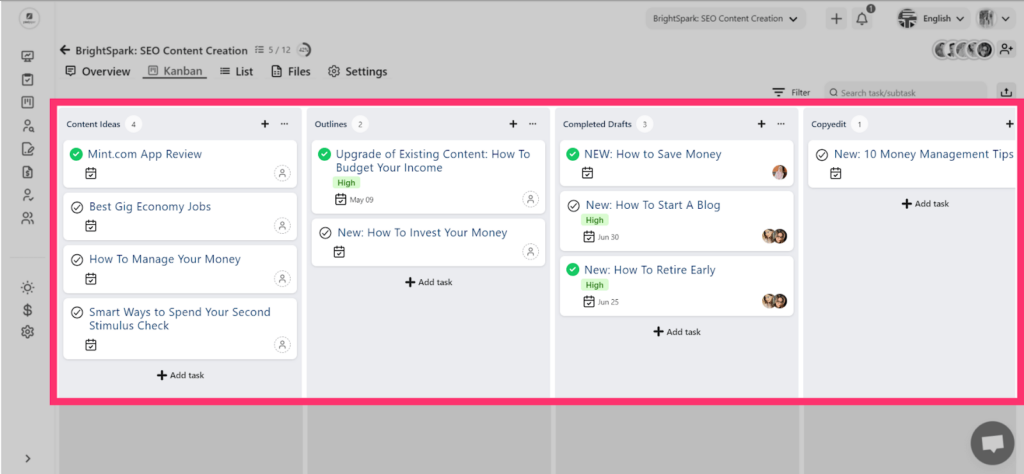
4. Project Cost Management
Project cost management is a way to estimate and allocate the cost of a project. It helps you determine a project’s financial status and can reduce or improve resources accordingly.
Suppose you are about to run a marketing advertisement. With the help of good project cost management, you can foresee the financial status of advertising and how much revenue you will get after this expense. As a project manager, you can understand your project lifecycle’s finances and control costs and budget.
By adhering to project cost management principles, you can streamline your project’s financial resources, reducing unnecessary expenses and ensuring the right resources are in place.
5. Project Quality Management
Project quality management is a way to proceed with the project to meet the client’s expectations with its best quality. To ensure good quality management, it’s important to follow the procedure that brings you the best quality.
For example, in OneSuite, you can create subtasks under a task to ensure the process goes through every required step. This way, you will get the best project quality management.

With good project quality management, you will meet the deadline with the best quality and client satisfaction and reduce project failure. This guidance should reassure you that you’re on the right path to delivering a high-quality project.
6. Project Resource Management
To manage a project, we need to plan, organize, schedule, and manage resources that belong to the project. For resources like people, tools, equipment, tech, facilities, etc., efficiently managing these resources is called project resource management.
For your better understanding, look at the images of OneSuite’e resource management,
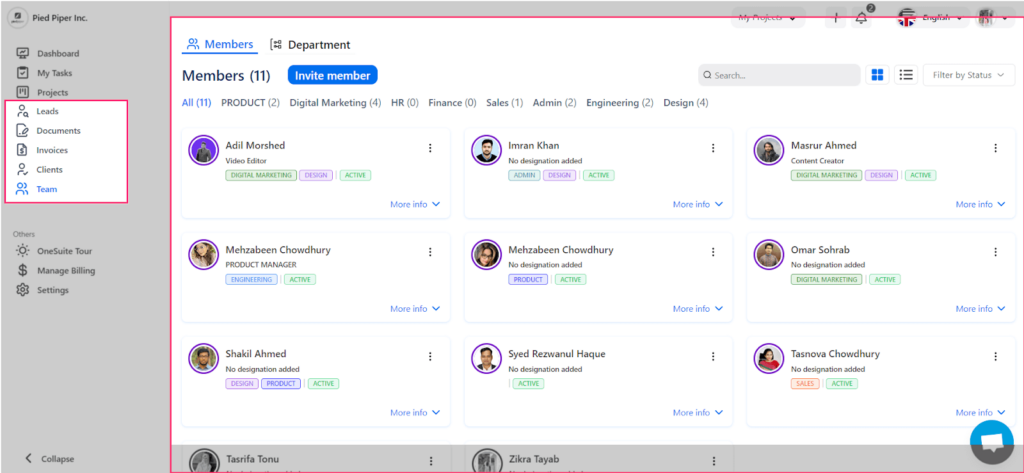
Effective project resource management allows you to locate any resource at any time, facilitating immediate task completion. This practical application of resource management underscores its importance in project execution.
7. Project Communications Management
It is easy to guess what project communication management could be.
Yes, you are right.
In project management, the process of delivering information to avoid misunderstandings, informing, etc, is called project communication management.
Suppose you are running a project that requires collaboration with stakeholders. The project communication management is the one to help you with this.
By implementing project communication management, you can significantly reduce misunderstandings and enhance the overall quality of project management, providing reassurance and peace of mind.
8. Project Risk Management
What do you do at the very first stage while managing a project?
Plan your project, right?
But does your project always act according to your plan? Sometimes, certain occurrences happen.
Project risk management is a process that can identify, anticipate, mitigate, and prevent sudden risks from your project.
For larger projects, the adoption of a risk management strategy is not just important, it’s urgent. Things won’t always go according to our plan, and it’s crucial to have a strategy in place before the risk of losing a project becomes a reality.
9. Project Procurement Management
We must often build relationships with external resources like vendors to buy or rent something while managing our projects. Procurement management is a process that creates and maintains this external resource management and organization.
As a restaurant manager, you play a pivotal role in procurement management. When you need to buy furniture for your restaurant, you initiate the process by identifying potential vendors and gathering their information. This active involvement is what makes procurement management a dynamic and integral part of your role.
According to the PMI’s PMBOK Guide, this management includes purchasing or acquiring products or services from outside the project team and maintenance.
10. Project Stakeholder Management
Project Stakeholder Management is the process of identifying and managing the needs and expectations of everyone involved in or affected by a project. It ensures stakeholders are informed, engaged, and satisfied throughout the project.
Imagine you’re organizing a community event. Stakeholder Management involves working with residents, sponsors, and volunteers to ensure everyone’s concerns are addressed and the event runs smoothly.
OneSuite provides the Client Portal for the client you would manage.
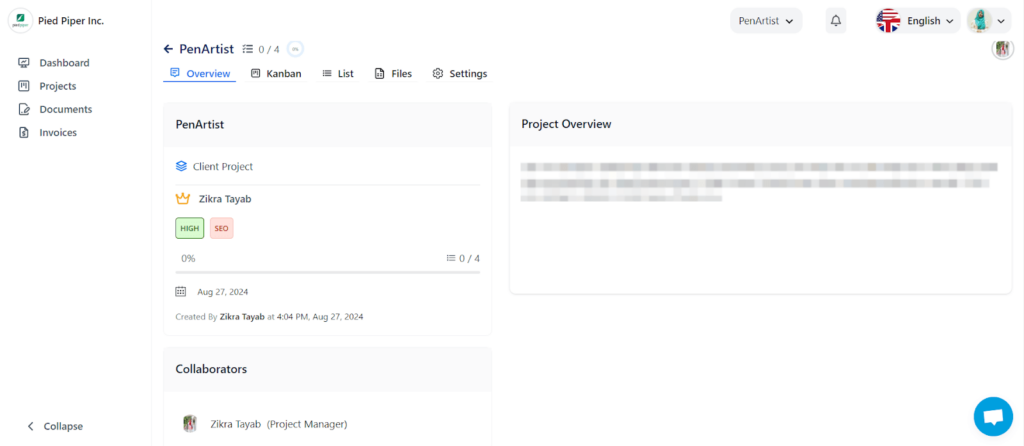
The above image is a client portal interface; this is a client view part. With the help of the OneSuite Client portal, you would manage your stakeholders to be aware of the project, what is going on, and who is handling which task.
Effective Stakeholder Management is a key factor in project success. It fosters better communication, minimizes conflicts, and increases the likelihood of achieving project goals by aligning everyone’s expectations.
Essential Knowledge Areas for Successful Project Management
Not necessarily; all the project management knowledge areas should be used for every project.
The application of project management knowledge areas is not rigid but flexible, depending on the project’s size, complexity, and requirements. Some projects may necessitate a focus on certain areas more than others, while smaller projects may not need all 10 areas.
However, some are the most essential knowledge areas that are necessary for successful project management. These are,
- Project Scope Management
- Project Time Management
- Project Quality Management
- Project Resource Management
- Project Stakeholder Management
To manage each of them, you must apply a project management tool for your project. There are numerous project management tools available. Out of all these project management tools, I will recommend OneSuite.
Why OneSuite?
Because it is one of the best project management software, it offers an all-in-one service that a project requires to manage a project successfully.
Furthermore, all the essential knowledge areas are readily available in OneSuite, ensuring that your project is comprehensively managed.
FAQs on Project Management Knowledge Areas
What is Project Management?
Project management is leading a team to achieve specific goals within a specified time frame. It involves planning, executing, monitoring, and closing projects to meet the desired objectives.
What is the Project Management Knowledge area?
A Project Management Knowledge Area is a key domain of project management that includes specific processes, practices, and techniques necessary for successfully managing different aspects of a project.
Can project Management Knowledge areas change?
Yes, the project Management Knowledge areas can change.
The knowledge areas can evolve as the project management field advances and new practices and technologies emerge. However, the core principles generally remain the same, ensuring a consistent project management framework.
Conclusion
The 10 project management knowledge areas are the foundation of effective project management.
By understanding and applying these areas, you can navigate the complexities of your projects and achieve successful outcomes. Tools like OneSuite can support these efforts more efficiently.



